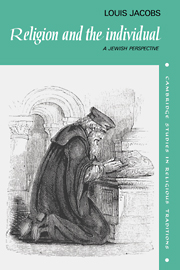Book contents
- Frontmatter
- Contents
- Preface
- List of abbreviations
- 1 Individual significance
- 2 Self-realization as a religious value
- 3 Attitudes to life and death
- 4 Family relationships
- 5 Loving the neighbour
- 6 Communal obligations
- 7 God and the soul
- 8 Does a person's body belong to God?
- 9 Worship with the body
- 10 God and personal freedom
- 11 Immortality
- 12 Conclusion: A question of emphasis
- Glossary
- Notes
- Bibliography
- Index
3 - Attitudes to life and death
Published online by Cambridge University Press: 11 October 2009
- Frontmatter
- Contents
- Preface
- List of abbreviations
- 1 Individual significance
- 2 Self-realization as a religious value
- 3 Attitudes to life and death
- 4 Family relationships
- 5 Loving the neighbour
- 6 Communal obligations
- 7 God and the soul
- 8 Does a person's body belong to God?
- 9 Worship with the body
- 10 God and personal freedom
- 11 Immortality
- 12 Conclusion: A question of emphasis
- Glossary
- Notes
- Bibliography
- Index
Summary
Although each individual is given in Judaism a large degree of autonomy he is never seen as so completely in control of his own life that he is allowed to dispose of it at will. Suicide is a very serious offence in Jewish law.
It is to be noted that there is no direct prohibition of suicide in the Torah as there is for murder (‘Thou shalt not kill’ in the Decalogue: Exodus 20:13 and Deuteronomy 5:17). In the Talmud, however, the prohibition is arrived at by a process of exegesis on the verse, ‘And surely your blood of your lives will I require’ (Genesis 9:5), interpreted as, ‘ I will require your blood if you yourselves shed it.’ It is possible that there is no direct prohibition because very few people of sound mind would be inclined to commit suicide in any event.
It follows from this that suicide and murder are two separate offences in the Jewish tradition. Suicide is not homicide and is not covered by ‘Thou shalt not kill’ in the Decalogue. In the Rabbinic classification of duties, referred to in the previous chapter, homicide would be considered an offence both ‘between man and God’ and ‘between man and man’ whereas suicide would fall only under the former heading. Maimonides states that, while murder is a capital offence, suicide is not and incurs only the penalty of ‘death by the hands of Heaven’.
It is not only actual suicide that is strictly forbidden. Any lack of care for one's health or any risk to life through activities which can be dangerous are forbidden under the heading of suicide.
- Type
- Chapter
- Information
- Religion and the IndividualA Jewish Perspective, pp. 15 - 19Publisher: Cambridge University PressPrint publication year: 1992
- 1
- Cited by



